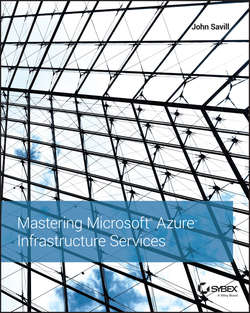Mastering Microsoft Azure Infrastructure Services

Реклама. ООО «ЛитРес», ИНН: 7719571260.
Оглавление
Savill John. Mastering Microsoft Azure Infrastructure Services
Acknowledgments
About the Author
Introduction
Who Should Read This Book
What's Inside
The Mastering Series
How to Contact the Author
Chapter 1. The Cloud and Microsoft Azure 101
Understanding the Cloud (or Why Everyone Should Play Titanfall)
Microsoft Azure 101
Getting Access to Microsoft Azure
Increasing Azure Limits
The Bottom Line
Chapter 2. When to Use IaaS: Cost and Options
Understanding Why an Organization Wants IaaS in the Public Cloud
Creating VMs in Azure
Understanding Azure Architecture
The Bottom Line
Chapter 3. Customizing VM Storage
Basic Virtual Machine Storage
Azure Storage 101
The Bottom Line
Chapter 4. Enabling External Connectivity
Cloud Services
Using Endpoints and Load Balancing
The Bottom Line
Chapter 5. Using Virtual Networks
Virtual Network Basics
The Bottom Line
Chapter 6. Enabling On-Premises Connectivity
Using S2S Virtual Private Networks
Using Point-to-Site Virtual Private Networking
Using ExpressRoute
The Bottom Line
Chapter 7. Extending AD to Azure and Azure AD
Using Active Directory Domain Services in Azure
Azure Active Directory
The Bottom Line
Chapter 8. Setting Up Replication, Backup, and Disaster Recovery
The Need for Disaster Recovery and DR Basics
Orchestrating Failover with Azure Site Recovery
Backing Up to Azure
The Bottom Line
Chapter 9. Customizing Azure Templates and PowerShell Management
Using Availability Sets and Autoscale
Managing Azure with PowerShell
VM and Template Management
The Bottom Line
Chapter 10. Managing Hybrid Environments with System Center
Looking Beyond the Azure Portal
Introduction to System Center
Implementing a Private Cloud
Enabling a Single Pane of Glass
The Bottom Line
Chapter 11. Completing Your Azure Environment
Azure Websites
Azure Traffic Manager
Azure Automation
Azure Scheduler
Azure RemoteApp
Azure AD Application Proxy
Azure Operational Insights
The Bottom Line
Chapter 12. What to Do Next
Understanding and Addressing Azure Barriers
Why You Should Use Azure and Getting Started
The Bottom Line
Appendix. The Bottom Line
Chapter 1: The Cloud and Microsoft Azure 101
Chapter 2: When to Use IaaS: Cost and Options
Chapter 3: Customizing VM Storage
Chapter 4: Enabling External Connectivity
Chapter 5: Using Virtual Networks
Chapter 6: Enabling On-Premises Connectivity
Chapter 7: Extending AD to Azure and Azure AD
Chapter 8: Setting Up Replication, Backup, and Disaster Recovery
Chapter 9: Customizing Azure Templates and PowerShell Management
Chapter 10: Managing Hybrid Environments with System Center
Chapter 11: Completing Your Azure Environment
Chapter 12: What to Do Next
WILEY END USER LICENSE AGREEMENT
Отрывок из книги
I could not have written this book without the help and support of many people. First, I need to thank my wife Julie for putting up with me being busier than usual for the last 6 months and for picking up the slack as always, and for always supporting the crazy things I want to do! My children, Abby, Ben, and Kevin, make all the work worthwhile and can always make me see what is truly important with a smile. Thanks to my parents for raising me to have the mind-set and work ethic that enables me to accomplish the many things I do while maintaining some sense of humor.
Of course, the book wouldn't be possible at all without the Wiley team: acquisitions editor Mariann Barsolo, developmental editor Mary Ellen Schutz, production editor Dassi Zeidel, copy editor Liz Welch, proofreader Kathy Pope, and indexer Ted Laux.
.....
The private cloud, through enhanced management processes and virtualization, brings a highly optimized on-premises solution. Ultimately, it still consists of resources that the organization owns and has to house year-round. As I mentioned earlier, CIOs don’t like writing checks for datacenters, no matter how optimal. All the optimization in the world cannot counter the fact that there are some scenarios where hosting on-premises is not efficient or even logical.
The public cloud represents services offered by an external party that can be accessed over the Internet. The services are not limited and can be purchased as you consume the service. This is a key difference from an on-premises infrastructure. With the public cloud, you only pay for the amount of service you consume when you use it. For example, I only pay for the amount of storage I am using at any moment in time; the charge does not include the potential amount of storage I may need in a few years’ time. I only pay for the virtual machines I need turned on right now; I can increase the number of virtual machines when I need them and only pay for those extra virtual machines while they are running.
.....